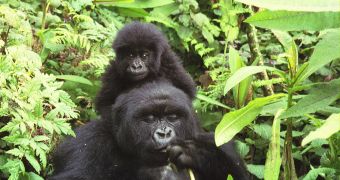Great Apes Film is currently testing the potential of a new sustainable and ingenious way of bringing educational films one step closer to the Ugandan people living in rural areas through its Pedal-Powered Cinema Project.
For almost three years, Great Apes Film Initiative has been trying to convince the public opinion that Uganda's mountain gorillas are highly vulnerable, the Guardian informs.
So far, Educational screenings failed to do the trick and spread the message to members of local communities in the vicinity of Mgahinga national park, from Uganda.
It seems that the new project has it all covered. It's supposed to be both eco-friendly and cost-effective, relying on easy-to-follow steps.
The back wheel of a stationary bike is connected to a generator that powers a projector and the sound system. Surprisingly, the new solution is also time-efficient since the whole system can be dismantled in only a few minutes.
Nevertheless, it has a negligible ecological footprint and it is lightweight; therefore easy to carry around, but somehow resistant enough to last for more than one trip in the remote Uganda villages.
Moreover, experts have reached the conclusion that the carbon dioxide triggered by a bicyclist, for every mile traveled, represents less than 1/10 produced by energy-efficient cars.
Bikes are definitely a reliable option, since they count as green and more affordable alternatives to the traditional petrol generator. The option encourages the participation of viewers that can listen to the story of the vulnerable creatures while taking turns to pedal for a good cause.
“ [...] when we explain the science behind the system, they learn how to teach the children about physics and it's also an ideal situation for them to talk about conservation and sustainable development, both for their own community and for Uganda as a whole," declares Madeleine Westwood, the developer of this green project.
Since 2010, when it has been first launched, the pedal-powered project helped educate 43,000 children and many more adults.
Even though some of them live near the national park, meant to preserve the balance of Uganda's gorilla population, a large segment of the public had never seen an actual creature of that kind before.

 14 DAY TRIAL //
14 DAY TRIAL //